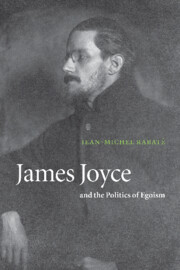Book contents
- Frontmatter
- Contents
- Preface
- List of abbreviations
- 1 Après mot, le déluge: the ego as symptom
- 2 The ego, the nation, and degeneration
- 3 Joyce the egoist
- 4 The esthetic paradoxes of egoism: from negoism to the theoretic
- 5 Theory's slice of life
- 6 The egoist vs. the king
- 7 The conquest of Paris
- 8 Joyce's transitional revolution
- 9 Hospitality and sodomy
- 10 Hospitality in the capital city
- 11 Joyce's late Modernism and the birth of the genetic reader
- 12 Stewardship, Parnellism, and egotism
- Notes
- Bibliography
- Index
2 - The ego, the nation, and degeneration
Published online by Cambridge University Press: 22 September 2009
- Frontmatter
- Contents
- Preface
- List of abbreviations
- 1 Après mot, le déluge: the ego as symptom
- 2 The ego, the nation, and degeneration
- 3 Joyce the egoist
- 4 The esthetic paradoxes of egoism: from negoism to the theoretic
- 5 Theory's slice of life
- 6 The egoist vs. the king
- 7 The conquest of Paris
- 8 Joyce's transitional revolution
- 9 Hospitality and sodomy
- 10 Hospitality in the capital city
- 11 Joyce's late Modernism and the birth of the genetic reader
- 12 Stewardship, Parnellism, and egotism
- Notes
- Bibliography
- Index
Summary
My title, “Joyce and the politics of egoism,” aims at demonstrating the centrality of a moment in the history of Modernism – the transformation of a feminist bi-weekly called The New Freewoman into an almost identical journal called The Egoist, a magazine that would not only publish Joyce's major novels, but also provide Pound and his friends with a platform for the dissemination of new ideas in England. To say that Joyce should be called an “egoist” is not just flippant provocation or personal accusation but an effort to link his literary and political position to a much older debate hinged around the claims of the “individual” flghting against repressive systems, claims that were often refused as being either “egoistic” or “anarchistic.” The change of name in the journals, whether it originated from its editor Dora Marsden or from her male friends, such as Ezra Pound, insists upon the importance of Max Stirner's revolutionary essay, Der Einzige und sein Eigentum (1844) for Dora Marsden and her collaborators. This rather obscure but scandalous tract quickly attracted Karl Marx's ire and became a cult book, sowing the seeds of philosophical anarchism among the left-Hegelians. It almost vanished from sight until it was translated into English in 1907 as The Ego and His Own. One should include George Meredith (with his famous novel The Egoist) within the circle of the writers directly or indirectly influenced by Stirner's conception of radical egoism, as we will see in the next chapter.
- Type
- Chapter
- Information
- James Joyce and the Politics of Egoism , pp. 24 - 42Publisher: Cambridge University PressPrint publication year: 2001



